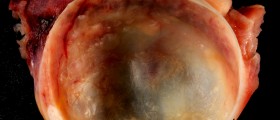
Common problem that women have to face are ovarian cysts. In many cases, these cysts are too small to cause any problems (such as pain or impaired fertility), but if they grow past certain size, they can induce pain by pressing against other tissues, or cause fertility problems.
Cysts are formed by mishaps in the menstrual cycle. The eggs in ovaries are produced within follicles, which rupture and release the egg at the appropriate moment in the cycle, and then disintegrate. If the egg is not released or the follicle does not disintegrate, it will form a cyst.Cysts mostly disintegrate by themselves during the next menstrual cycle. In some cases, they can accumulate and grow. This is influenced by many factors, such as improper liver function and low-fiber diet.
Symptoms
Cyst related pain causes sore ovaries. Pelvic area on the side where the affected ovary is located will feel sore or numb and there may be a burning sensation. It may, similar to inflammation of the vermiform appendix, cause the area to be sensitive to touch, which causes sharp pain.
What to do
It is important to seek physician's advice if any of these symptoms (pain and reproductive problems) are present, in order to determine what is causing the problem and how serious it is. Pain can originate not only from cysts, but from cancer and various other causes as well. It is possible that a conventional medical treatment will be required (as in cancerous cysts), but in many cases, ovarian cysts can be treated with herbal therapy, which should be approved by a physician.
Herbal treatment is 'natural' and allows body to self-heal, which is always desired, but expert advice is to be sought after before any home-made treatment begins. While herbal treatment helps fight cysts, some herbs may contain ingredients potentially dangerous to the fetus in early stages of pregnancy, so if pregnancy is the goal of fighting ovarian cysts, some supplements are to be avoided.
What to use
Vitamin E reduces formation of cysts, while vitamin C helps with cyst-related inflammations. Essential fatty acids, such as gamma-linolenic acid, are a prime remedy for ovarian cysts. Supplements abundant with essential fatty acids include oils such as borage oil, evening primrose oil, olive oil, flax seed oil and black currant oil.
Bioflavonoids are beneficial in treating sore ovaries and help preservation of estrogen in the organism. Grape seeds, garlic, onions, cherries and citrus fruits are good sources of bioflavonoids. Other plants that help in estrogen level regulation are licorice and black cohosh, both a natural source of estrogen, and ginseng, which contains chemicals similar to estrogen. Other effective plants include chaste berry (ailment), fennel (resolves crampy pain), false unicorn, and fennel.

















Your thoughts on this
Loading...